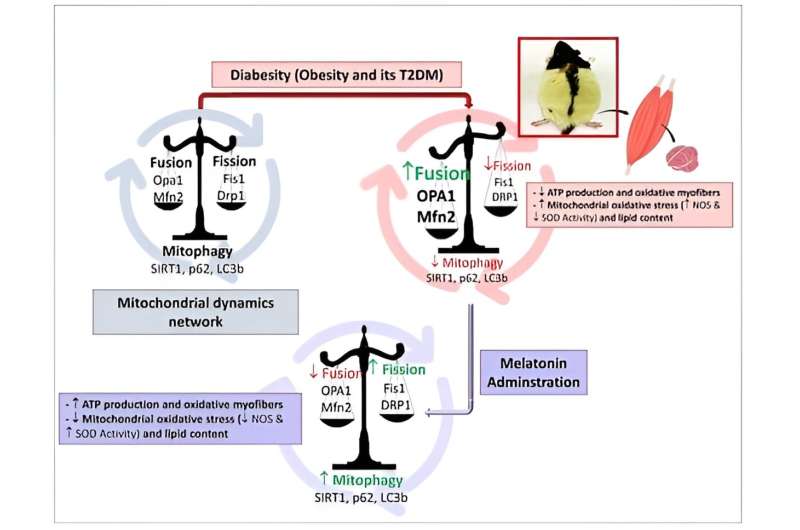This article has been reviewed according to Science X's editorial process and policies. Editors have highlighted the following attributes while ensuring the content's credibility:
fact-checked
trusted source
proofread
Researchers demonstrate the positive effect of melatonin in the prevention of obesity

Two international studies led by the University of Granada (UGR) have confirmed that melatonin helps prevent obesity. In addition, its effects are positive against visceral obesity, a particularly worrying fat that accumulates deep in the abdomen, close to vital organs, which can cause serious health problems.
Scientists from the Department of Pharmacology of the UGR, the Federico Olóriz Neurosciences Institute of the University of Granada, the Biosanitary Institute of Granada and the University of Qatar are working on this research. UGR professor Ahmad Agil heads these studies, which have been published in the journals Antioxidants and Biomedicine & Pharmacotherapy.
The experiment, carried out in obese and diabetic adult rats of both sexes, has found that chronic administration of the melatonin drug (10 mg/kg body weight/day and for three months) prevents obesity to a greater extent than acute treatment and reduces visceral obesity by around 3%. It also ameliorates the muscle-fiber atrophy caused by obesity, the transformation of the muscle fiber type into a more oxidative and slower phenotype, and generates an increase in mitochondrial activity and content, which explains the reduction in weight gain in both female and male rats.
The combination of melatonin administration with bathing in slightly cold water, around 17°C (the average sea temperature) further enhances weight reduction, according to this research. The scientists suggest that this method can help people with obesity.
UGR professor Ahmad Agil explains that "problems of obesity, overweight and type 2 diabetes are becoming increasingly common in developed and developing countries."
This reality is a consequence of a bad adaptation of the human genome to the current environment of caloric environmental factors, elements that can be modified and controlled: sedentary lifestyle, consumption of hypercaloric food and drink with constant and unlimited access, isolation from the cold, negative industrial manipulation of food with additives such as snacks, sweeteners and flavor enhancers, and alteration of circadian biological rhythms due to excessive and chronic exposure to night light: from performing night work, nocturnal food intake, sleep disorders, stress and lack of exposure to natural light, which reduces endogenous melatonin levels.
Ahmad Agil recommends choosing appropriate activities based on each person's internal biological clock day and night.
"During the day, it is good to expose yourself to natural light, do adequate physical activity, choose low-calorie diets loaded with unprocessed foods and replace these additives with thermogenic spices and herbs, avoid eating between meals, do not wear insulating clothing and keep the heating at a comfortable and cool temperature of around 17°C, as well as showering with cool water."
During the night, the expert recommends sleeping in the dark, avoiding the use of blue light-emitting devices one or two hours before bedtime and fasting, which increases endogenous melatonin levels. He also advises our elders to administer low doses of melatonin by physician prescription (because their endogenous melatonin levels are reduced by age) and even more in case of obesity to administer high doses (pharmacological).
"Our main challenge is the application of melatonin and other strategies, such as intermittent fasting, in the field of medicine, especially to address the possibility from a treatment perspective of the aforementioned pathologies (diabesity and its complications) that involve increased oxidative-mitochondrial stress, mitochondrial damage and associated metainflammation (low-grade inflammation of metabolic origin)," Agil points out.
The results of these studies are in line with those previously published by the same researchers over the last 13 years, which demonstrate that the pharmacological administration of melatonin constitutes another new strategy in the therapeutic approach to diabesity (central obesity and its type 2 diabetes) and its complications, such as hepatic steatosis, hypertension, lipid alteration, etc.
The results also point out that this substance curbs obesity and improves metabolic function through the activation of brown fat and the browning of subcutaneous body fat. Melatonin even promotes adipogenesis of beige mesenchymal stem cells in humans.
According to the results, melatonin could help treat visceral obesity, which establishes the need to develop new clinical trials to prove its effectiveness in humans. There are already tests done in humans that show positive results.
"The encouraging indicators obtained in preclinical models invite to take melatonin to the next phase, in order to investigate how it helps in the maintenance of mitochondrial homeostasis and, to a greater extent, if melatonin therapy would allow to delay or stop obesity and its complications, by boosting its chronic pharmacological use," said Agil.
More information: Diego Salagre et al, Melatonin Improves Skeletal Muscle Structure and Oxidative Phenotype by Regulating Mitochondrial Dynamics and Autophagy in Zücker Diabetic Fatty Rat, Antioxidants (2023). DOI: 10.3390/antiox12081499
D. Salagre et al, Chronic melatonin treatment improves obesity by inducing uncoupling of skeletal muscle SERCA-SLN mediated by CaMKII/AMPK/PGC1α pathway and mitochondrial biogenesis in female and male Zücker diabetic fatty rats, Biomedicine & Pharmacotherapy (2024). DOI: 10.1016/j.biopha.2024.116314





















